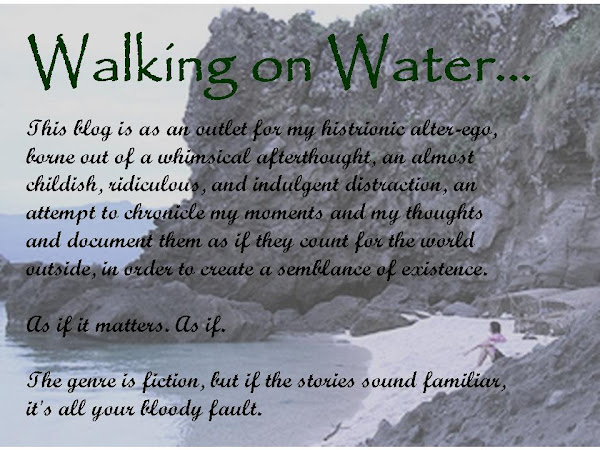I’ve been staring at this blank computer screen for some
time now. I’m down to my last few days of vacation and it is imperative that I
should at least get some decent writing done. Witty Facebook status updates
with poorly-taken phone-camera photos are far from being acceptable. I have to
squeeze something out of my lethargic brain, at least. Or else, this hiatus
from work will be no more than a figment of memory from sweeter, slower,
work-free days.
I’ve been spending my time reading books. The first is
Victor Hugo’s Hunchback of Notre Dame, which, as my good friend M said, is a
must-read – something that a romantic, onion-skinned, trying-hard-to-be-an-intellectual-but-only-succeeds-in-being-a-lunatic
like me must read before they die. Well, I finished the book two days ago. Does
that mean that I’m ready to die?
My friend M and I discussed mortality once. I remember this
quite vividly and very fondly because M rarely opens up about anything personal
and this conversation is just about as personal as we could get. In fact, this
is the only time he ever agreed to discuss death, which is quite surprising
because M and I hang out as often as possible and melancholy Jean here loves to
talk about it. It was one of those impromptu dinners when we talked about how
we’ve always felt about dying young. A decade ago, my friend has always felt he’d
die at 38. He’s now 40, and very much alive, literally and metaphorically. I
have always thought I’d die by 40 too. But then of course, I’m still several
years away from that. Nevertheless, because of our conviction that we’d die
young, we both developed this crazy obsession for life. We strive everyday to
learn, to love, to be grateful, to appreciate every single breath. This is
probably the reason why we had an instant bond, a certain chemistry that is
rather rare for strangers who meet in mid-life. To make a long story short, M
and I concluded that even if we live a little bit on the edge daily, always
anticipating our mortality, always ready to leave the world as unexpectedly as
when we arrived, this is how we’re all supposed to live – to appreciate every
single breath, to enjoy life as a gift and not as a right, to learn and love as
much as we can, and to be thankful for everyday and live it as if it’s your
last.
Anyway, back to Victor Hugo. Sorry for digressing. I got
carried away. It’s one of the most tragic novels I’ve read. Everyone seems to be
nurturing unrequited affections for somebody else. Although it was beautifully
written, I could not help but feel like I’ve wasted my time. I loved the book,
don’t get me wrong. Mr. Hugo weaves every word into a masterpiece. I, however,
am very much acquainted with unrequited love already. Too much that a mere
mention of it is enough to make me retch. I didn’t retch when I read the book,
of course. I was merely exaggerating. I
felt so much for Quasimodo. Because whether I admit it or not, I am a Quasimodo
too. I've always felt as deformed, as alienated, as unloved. Perhaps being unloved induces a vicious cycle of being unloved more. I may not have that hunchback or that horrible blind eye, or those grossly malformed limbs, but I am a Quasimodo too, in more ways than one can ever imagine. It's the deformity of the spirit that's harder to cure.
And my Esmeralda? I guess I talked about him a few
paragraphs ago. I’m on vacation, but my thoughts drift back to him. I was
supposed to run away, to keep my distance, but here I am writing about him. The
only difference this entry has from my last several blog posts is the fact that
I’m writing this in Boracay, far from the maddening stress of work, far from
that lovely place we both call home.
Borrowing the last line from the novel, “When they tried to
pull his skeleton away from the one he held in his arms it crumbled into dust.”
I must crumble into dust soon enough.


No comments:
Post a Comment